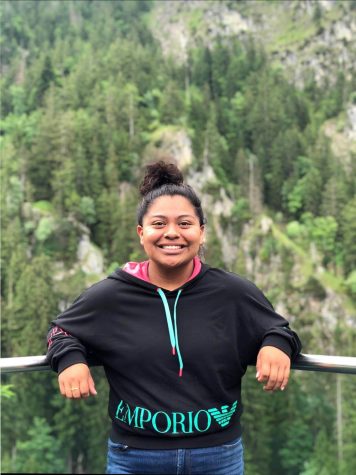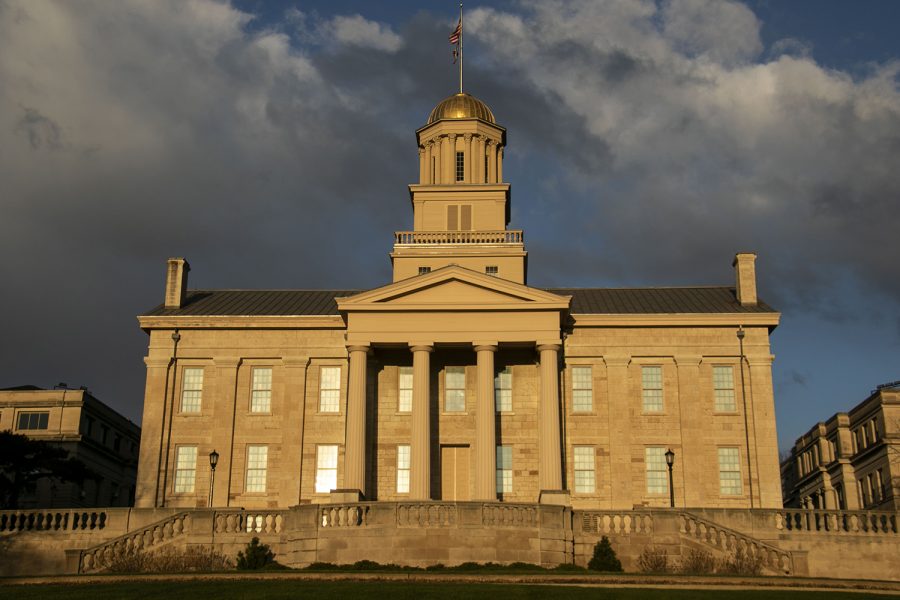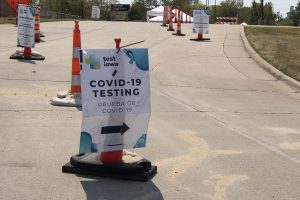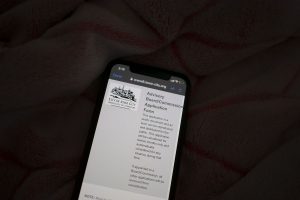Students face tough choices as Thanksgiving break and a virtual instruction period coincide with virus outbreaks
As cases of COVID-19 skyrocket in Iowa, Hawkeyes are deciding whether to head home to celebrate the holidays.
Old Capital as seen on April 13, 2020.
November 17, 2020
As fall break approaches, University of Iowa students are torn between traveling home – and potentially exposing family members or themselves to COVID-19 – or remaining in Iowa City, missing the opportunity to spend time with their families.
On Nov. 6, the UI provided suggestions for students to consider when making plans for fall break in a COVID-19 update. The UI said the decisions students, faculty, and staff make during the break have the potential to impact not only their health, but the health of others around them.
The university advised those in the UI community who are seeing family members over break to create a plan beforehand, especially if those family members are at a higher risk for COVID-19 complications. More than 1,800 students responded to a UI survey asking about plans for break — half said they would stay in Iowa City, said Campus Health Officer Dan Fick at a Faculty Senate meeting on Tuesday.
RELATED: Where can University of Iowa students get a COVID-19 test?
“While this planning may include getting a test, health experts emphasize that a negative test result may occur early in a COVID-19 infection,” a UI update said. “A negative test result does not guarantee that you are free of the virus, and you still may be able to spread the virus to others.”
UIHC Associate Hospital Epidemiologist Melanie Wellington wrote in an email to The Daily Iowan holiday gatherings should be kept as small as possible this year to prevent the spread of COVID-19.
“Ideally, we will celebrate the holidays with only our household members. If you don’t have a choice about attending a gathering of people outside your household, you should wear a mask at all times during the gathering,” she said. “If at all possible, people should not eat or drink at gatherings or eat/drink outdoors.”
Wellington said students should consider self-quarantining for 14 days upon arriving home.
Related: UIHC CEO recommends rethinking holiday plans amid worst chapter of COVID-19 pandemic
“Even with all of our on-campus safety measures, it is still possible that a student could be infected with SARS-CoV-2 but not have any symptoms,” she said. “If that person travels home, their family at home is at risk of infection. If a student has a family member who is at high risk of developing severe disease, the student should strongly consider not visiting that person.”
Johnson County Public Health Department Community Health Division Manager Sam Jarvis said families should consider alternative options for celebrating instead of a large in-person gathering.
“Virtual get togethers, phone calls, and all the other ways to connect with friends and family while not in person are some of the safest alternatives,” he said. “It may not be the same, but it could mean not getting ill or getting someone else ill.”
Some students who interact with people daily for work have decided to remain in Iowa City to protect family members who are highly susceptible to COVID-19.
UI second-year Sydney Uhlman, who works at Burge Residence Hall, said she felt unsafe returning home for Thanksgiving Break given the large amount of people she interacts with while in Iowa City.
“I will be spending my Thanksgiving alone, which isn’t ideal, but I can’t justify putting my family at risk,” Uhlman said. “Luckily, I’m in an apartment, so I have the ability to kind of stay put where I am, but I know not a lot of people have that choice.”
Testing sites in Iowa City – such as UI Hospitals and Clinics and UI Quick Care – only allow testing for those who have been exposed to someone who tested positive or have COVID-19 symptoms themselves.
Those who wish to be tested can go to a Test Iowa site, with the nearest locations in Cedar Rapids and Davenport. Hy-Vee and Walgreens also offer free testing.
Uhlman said many students who live on campus without a car have limited options to get a test before Thanksgiving break, and she herself traveled to the Cedar Rapids Test Iowa location many times to receive a test.
“Because, you know, you can only get tested at Quick Care if you have known exposure or symptoms,” she said. “Students just don’t have the accessibility to testing when they go back to their families, which is a huge problem.”
UI first-year Jocelyn Olivera understands first-hand what it is like to be around COVID-19 patients. As a patient care technician at St. Luke’s Hospital in Cedar Rapids, she said she is working during Thanksgiving break, so she won’t be able to see her family.

She said her parents were sad, but since her dad has diabetes, she wants to wait up to two weeks before seeing him so as to not infect him.
She said working in the hospital during the pandemic has been hectic.
Related: With cases rising, University of Iowa officials warn Iowa hospitals will soon be overwhelmed
“When I first started everything was fine with COVID-19, the cases were low,” Olivera said. “But, now as winter is coming and the flu season is here, everything is going up again. It is just kind of scary because sometimes you see people die and that really is not the best thing to see.”

She added that she’s disappointed in some of her fellow Hawkeyes for going to parties or bars on the weekends and not taking the virus seriously.
“For me working in the hospital, it is just frustrating to see [students] here at Iowa go out so much, especially during game days,” she said. “They are having fun, but they are not wearing a mask, they are not social distancing. Do they not understand that there is something bigger happening than a football game? Obviously, that is fun, but there is a pandemic happening. Just two simple things: wearing a mask and social distancing, and everything could go away possibly.”
Vanessa Kawala, a UI first-year student from Des Moines, is one of many students still planning to celebrate the holidays with family.
“I have a huge family, so we plan on celebrating all together,” she said. “I know a few people are coming in from different cities, so that is going to be exciting.”
Kawala said no one in her family is high-risk, but she still wants to get tested beforehand in Des Moines, and plans to limit activities for the few days before returning home.
“For my own safety and the safety of my family, I am thinking about getting tested before I go back,” she said. “After Thanksgiving, I am not coming back until the spring semester, which I think would just be the smartest choice, and everyone around me is not coming back as well.”
Caitlin Crome, Grace Hamilton, Lillian Poulsen, and Clinton Garlock contributed to this report.






